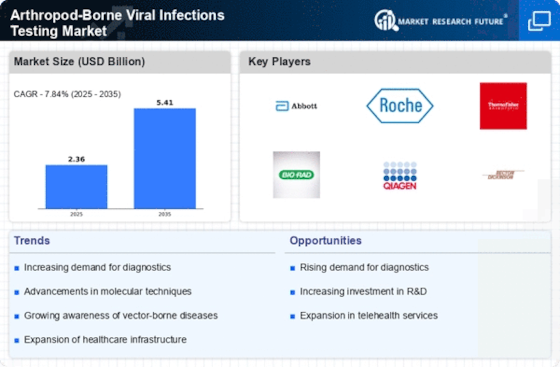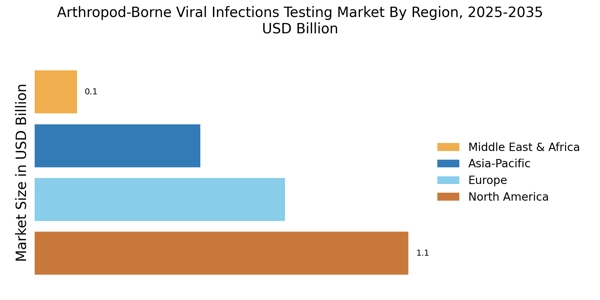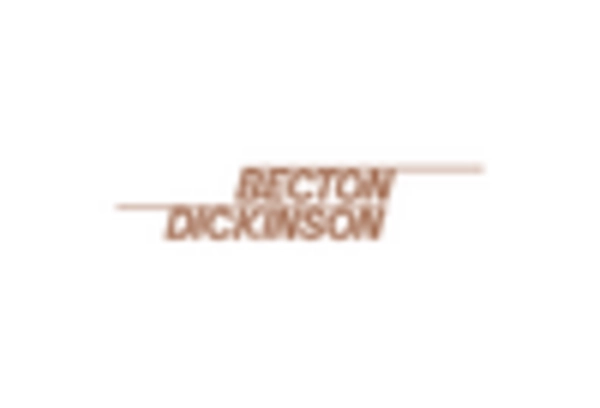Government Initiatives and Funding
Government initiatives aimed at controlling arthropod-borne diseases significantly influence the Arthropod-Borne Viral Infections Testing Market. Various health authorities are allocating substantial funding for research and development of diagnostic tools and public health campaigns. For example, initiatives to enhance surveillance systems and improve laboratory capacities are being implemented in many countries. These efforts not only aim to reduce disease transmission but also promote the adoption of testing services. Increased funding for public health infrastructure is likely to bolster the market, as it facilitates the development of innovative testing solutions and enhances accessibility to diagnostic services in affected regions.
Advancements in Diagnostic Technologies
Technological innovations in diagnostic testing are transforming the Arthropod-Borne Viral Infections Testing Market. The introduction of advanced molecular techniques, such as polymerase chain reaction (PCR) and next-generation sequencing, enhances the accuracy and speed of virus detection. These technologies allow for the identification of multiple pathogens simultaneously, which is crucial in regions where co-infections are common. The market is witnessing a shift towards point-of-care testing, enabling rapid results and facilitating immediate clinical decisions. As healthcare providers increasingly adopt these sophisticated diagnostic tools, the demand for testing services is expected to rise, thereby driving the growth of the Arthropod-Borne Viral Infections Testing Market.
Growing Demand for Preventive Healthcare
The rising emphasis on preventive healthcare is a notable driver for the Arthropod-Borne Viral Infections Testing Market. As awareness of the health impacts of arthropod-borne diseases grows, individuals and healthcare providers are increasingly prioritizing early detection and prevention strategies. This shift is reflected in the growing market for testing services, as proactive measures are deemed essential in managing public health risks. The integration of testing into routine health check-ups and travel health advisories further underscores this trend. Consequently, the demand for reliable testing solutions is expected to escalate, thereby contributing to the expansion of the Arthropod-Borne Viral Infections Testing Market.
Impact of Climate Change on Disease Patterns
Climate change is altering the distribution and transmission dynamics of arthropod-borne diseases, which in turn affects the Arthropod-Borne Viral Infections Testing Market. As temperatures rise and weather patterns shift, the habitats of disease-carrying vectors, such as mosquitoes and ticks, are expanding. This phenomenon is likely to lead to increased outbreaks in previously unaffected areas, necessitating enhanced testing capabilities. Public health authorities are recognizing the need for adaptive strategies to monitor and respond to these changes, which may drive investment in testing technologies. The evolving landscape of disease transmission due to climate change presents both challenges and opportunities for the Arthropod-Borne Viral Infections Testing Market.
Rising Incidence of Arthropod-Borne Diseases
The increasing prevalence of arthropod-borne diseases, such as dengue fever, Zika virus, and chikungunya, is a primary driver for the Arthropod-Borne Viral Infections Testing Market. Reports indicate that the incidence of these diseases has surged in various regions, leading to heightened demand for effective testing solutions. For instance, the World Health Organization has noted a significant rise in dengue cases, with millions affected annually. This trend necessitates robust testing mechanisms to ensure timely diagnosis and treatment, thereby propelling market growth. As healthcare systems strive to manage outbreaks, the need for accurate and rapid testing methods becomes paramount, further stimulating the Arthropod-Borne Viral Infections Testing Market.

















